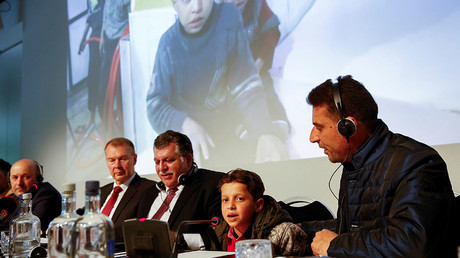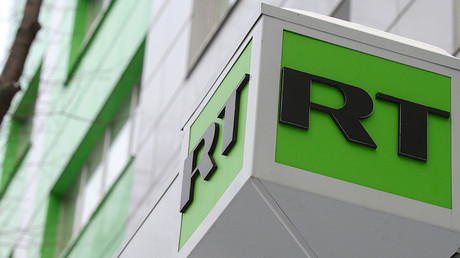How the US stifles free speech: Reviving McCarthyism & nurturing Orwellian society
Published time: 10 May, 2018 11:47

The new or expanded Global Engagement Center under the State Department seems to be morphing into what one might someday recognize as Orwell's "Ministry of Truth."
Recent events over past months have caused many to suspect the reliability of news and information provided to us, often by our own governments. Alternative news sources threaten to disrupt the message or narrative crafted by governments and large organizations. The US Global Engagement Center is mobilizing in response to counter alternative media, conflicting perspectives and foreign influence such as ‘Russian Propaganda.’
The rush to judgement, complete failure to follow international norms, and subsequent actions in response to both the alleged poisoning of Sergey and Yulia Skripal in Salisbury in the UK and the alleged use of chemical weapons in Syria leaves many questions unanswered. That narratives of government officials and mainstream media (MSM) are in lockstep despite the lack of any real evidence makes one suspicious of the ultimate objectives. Whatever these objectives may be, they certainly appear misplaced and bring increased international tension. Both these instances have the appearance of ‘false flag’ operations.
However, despite the lack of a thorough investigation, British Prime Minister May was quick to state the Skripals were poisoned with a nerve agent, Novichok, and claimed it was “highly likely” that it was the Russian government behind the attack. Both the UK and Russia are signatories of the international Chemical Weapons Convention. There are set procedures to be followed in the event of the suspected use of chemical weapons, such as Novichok, which include notification of the OPCW, cooperation of state parties and the instigation of a fact-finding investigation. These procedures were not followed and, in fact, Russia has yet to be included in the investigation or even provided samples.
There seems to be a veil of secrecy surrounding so many aspects of the entire incident. Despite the lack of evidence and the fragmentation of the initial storyline, the Skripal poisoning served certain interests by diverting attention away from the UK government and toward Russia. The subsequent mass expulsions of Russian diplomats from the UK, US and EU countries caused the further deterioration of international relations. Throughout this period, MSM toed the party line and lately it appears to have gone silent.
Closely following the Skripals’ poisoning, surprise-surprise, the famed White Helmets released a video of an alleged chemical weapons attack in Douma, Syria. Once again, despite no evidence and prior to the arrival of OPCW inspectors, the US, UK, and France launched airstrikes against Syria, targeting supposed chemical weapons facilities. There has yet to be any indication that a chemical weapons attack actually took place. Local citizens and doctors have testified recently that there was no chemical attack and that the incident was staged. Once again, MSM fails to cover the inconsistencies of the story which call in to serious question the actual occurrence of the attack.
Information from MSM sources, for the most part, is completely in compliance with information either being filtered or suppressed to support the desired narrative. The storylines, absent of credible facts or evidence, is reminiscent of the ‘Trust Me!’ approach regarding Weapons of Mass Destruction that led to ‘Operation Iraqi Liberation’ (renamed Operation Iraqi Freedom). The most recent instances add to the ongoing Russophobic hysteria engulfing the West under a very questionable pretext.
Those that are skeptical of the official narrative or act to provide a differing perspective are frequently ridiculed and demonized, often accused of being one of Putin’s useful-idiots. The list seems to be endless and spans from Russian scholar Professor Stephen Cohenand Australian journalist John Pilger to UK Labour leader Jeremy Corbyn or, at times, even the Republican Party. This past year we have seen many alternative media sources essentially “blacklisted” by the secretive organization PropOrNot which published the names of more than 250 alternative news sources, accusing them of being Russian agents. The Washington Post promoted the story and, originally, ProporNot’s “List”. Only later did the Post add an introductory comment and delete the direct link to the List. The story was subsequently picked up and distributed by the Daily Beast and USA Today.
In October, another “blacklist” surfaced, identifying more than 2,300 guests of the Russian news station, RT. The list was published by a Czech Non-Governmental Organization (NGO), ‘European Values,’ whose largest donor just happens to be George Soros’ Open Society Foundation – in addition to US, UK, and EU government contributions.
We often view that the foundation of democracy lies in the freedom of one’s beliefs, in one’s right to express ourselves whether that is through print, speech, or the sharing of ideas. The First Amendment enshrines these concepts with the Freedom of Speech, Freedom of the Press, Freedom of Religion, and Freedom to Assemble. Yet the ability to shape those ideas and thoughts relies on the ability to have open access to information and to participate in a dialogue of our beliefs and ideas. With the advent of media, and more recently with the internet and social media, access to and sharing of information with differing views has expanded immensely.
However, recent initiatives have acted to stifle this open and free communication. The passage of the National Defense Authorization Act of 2017 (P.L. 114-328, FY 2017 NDAA, section 1287) codified the Global Engagement Center and significantly expanded its role.
The Global Engagement Center (GEC) evolved from the original Counterterrorism Communications Center (CTCC). The CTCC was established in the aftermath of the terrorist attacks of 9/11. Its objective was the coordination inter-agency messaging and to coordinate specific messaging for the Department of State and Department of Defense. The CTCC went through several restructurings through the years until it was the Center for Strategic Counterterrorism Communication (CSCC) – with essentially the same mission. The organization had minimum funding and no direct line item from Congress. President Barack Obama issued Executive Order 13721 in March 2016, which officially established the GEC in lieu of the CSCC. The GEC purpose and structure were similar to the CSCC. It was tasked with leading inter-agency efforts in support of US government-sponsored counterterrorism communications.
Section 1287 states that the GEC’s purpose is to “counter foreign state and non-state propaganda and disinformation efforts” that threaten US national security interests as well as security interests of US allies and partner countries. This significantly changes the GEC’s role from one of counterterrorism to one of countering foreign communications per se.
Moreover, it provides the new GEC with significant resource authorizations well beyond those previously provided. Along with the significant expanded mission area and increased authority, the GEC will receive substantially greater funding and will include direct funding from Congress as well as authority for an additional $60 million to be transferred from the Department of Defense.
The GEC expansion of responsibilities is a result of the challenges of articulating a consistent message and to counter alternative information and perspectives. Legislation seeks to strengthen the GEC in order to counter foreign influence, primarily Russian and Chinese disinformation efforts. This evolution of the GEC is not without challenges. Earlier versions of the GEC were underfunded and undermanned. The legislation and subsequent mission shift has been given to an organization operating with a focused mission to counter primarily extremist terrorism and ill-prepared to counter global information flows with varying perspectives.
For instance, based on the New York Times, “not one of the 23 analysts working in the department’s Global Engagement Center – which has been tasked with countering Moscow’s disinformation campaign – speaks Russian, and a department hiring freeze has hindered efforts to recruit the computer experts needed to track the Russian efforts.” As implied by Vanity Fair, resource challenges, a changing mission, new technology, organizational confusion, and leadership uncertainty have contributed to the questionable performance and future of the GEC. Yet, the NDAA 2017, as well as more recent emphasis from Congress, provide the clear intent from Congress for the increased global role of the GEC, along with the authority and resources to support it. This, along with the recent confirmation of Secretary of State Mike Pompeo and new GEC leadership, may see the GEC rapidly evolve to complete its transformation and become the master of information.
Congressional pressure on technology companies, specifically social media organizations, throughout the evidence-free Russiagate hearings has contributed to filtering what and how we access information. Facebook, Google, and Twitter have been grilled in hearings and are taking steps to control the flow of information. Facebook has engaged fact-checkers to verify information. One wonders who checks the fact-checkers? Facebook, Twitter, YouTube and Google have also developed filters and Trust Indicators to prioritize what is seen, or not seen, and how, by users.
This is done in the name of combating ‘fake news’ or countering alleged Russian propaganda. These actions, as well as demonetizing sites, controlling advertising (RT and Sputnik advertising banned on Twitter), censoring information (Southfront and Veterans Today), de-ranking as with RT, or cancelling and suspending accounts (SyrianGirl banned on Facebook and YouTube) directly influence one’s access to information, essentially censoring for the good of the public.
Censorship and disinformation infringes on our ability to access factual information, to form our own judgements, to enlighten ourselves to differing perspectives. It essentially acts to shape our perspectives to preconceived narratives that may be counter to our own underlying values. It is a realization of George Orwell’s ‘Newspeak’. It is a direct attack on the most fundamental right of a free and open society – the right of free speech. We have been gradually witnessing the erosion of the underlying principles of democracy. The threat is not from any foreign power, it’s from within.
Where are we going as a country? Are we reincarnating McCarthyism? Are we nurturing an Orwellian society? I would hope not but similarities are definitely there.
Earl Rasmussen, Executive Vice President of the Eurasia Center, for RT
The statements, views and opinions expressed in this column are solely those of the author and do not necessarily represent those of RT.





0 Comments:
Post a Comment
Subscribe to Post Comments [Atom]
<< Home